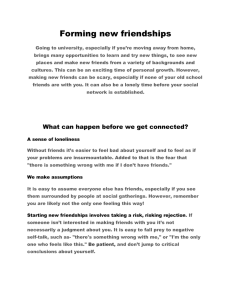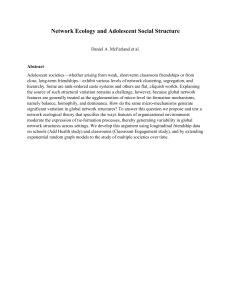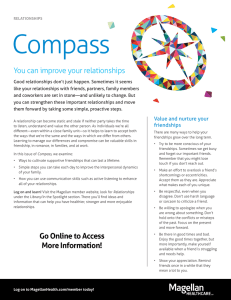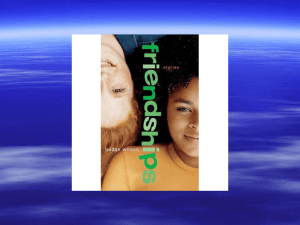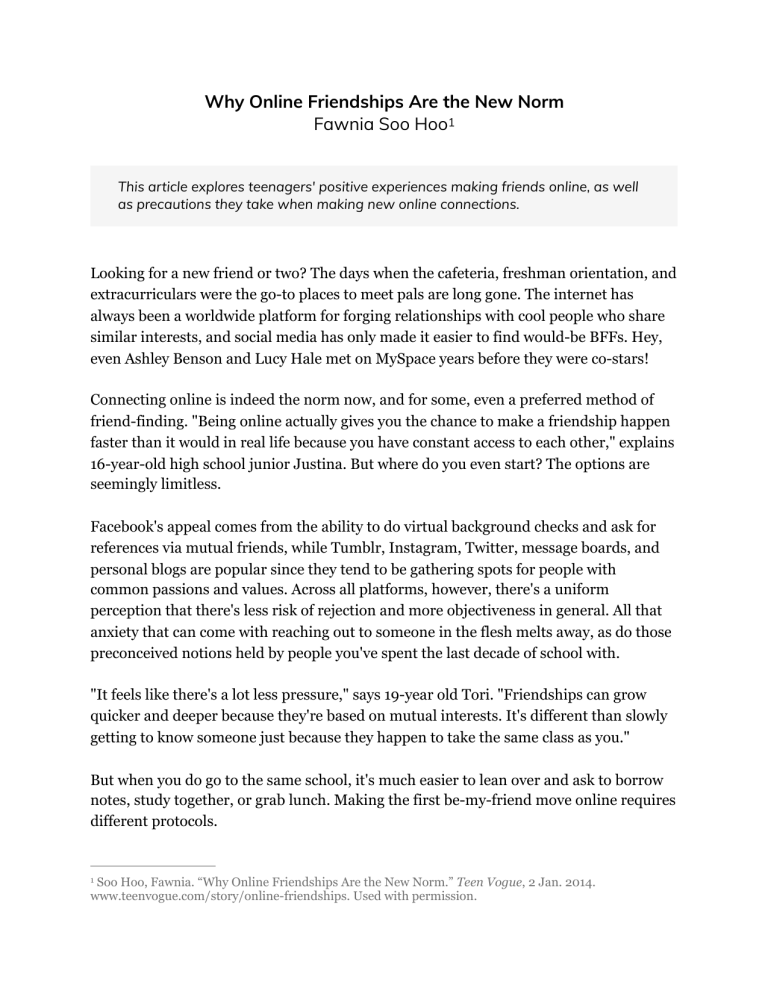
Why Online Friendships Are the New Norm Fawnia Soo Hoo1 This article explores teenagers' positive experiences making friends online, as well as precautions they take when making new online connections. Looking for a new friend or two? The days when the cafeteria, freshman orientation, and extracurriculars were the go-to places to meet pals are long gone. The internet has always been a worldwide platform for forging relationships with cool people who share similar interests, and social media has only made it easier to find would-be BFFs. Hey, even Ashley Benson and Lucy Hale met on MySpace years before they were co-stars! Connecting online is indeed the norm now, and for some, even a preferred method of friend-finding. "Being online actually gives you the chance to make a friendship happen faster than it would in real life because you have constant access to each other," explains 16-year-old high school junior Justina. But where do you even start? The options are seemingly limitless. Facebook's appeal comes from the ability to do virtual background checks and ask for references via mutual friends, while Tumblr, Instagram, Twitter, message boards, and personal blogs are popular since they tend to be gathering spots for people with common passions and values. Across all platforms, however, there's a uniform perception that there's less risk of rejection and more objectiveness in general. All that anxiety that can come with reaching out to someone in the flesh melts away, as do those preconceived notions held by people you've spent the last decade of school with. "It feels like there's a lot less pressure," says 19-year old Tori. "Friendships can grow quicker and deeper because they're based on mutual interests. It's different than slowly getting to know someone just because they happen to take the same class as you." But when you do go to the same school, it's much easier to lean over and ask to borrow notes, study together, or grab lunch. Making the first be-my-friend move online requires different protocols. Soo Hoo, Fawnia. “Why Online Friendships Are the New Norm.” Teen Vogue, 2 Jan. 2014. www.teenvogue.com/story/online-friendships. Used with permission. 1 2 "You might follow them on Instagram and comment underneath their pictures, or respond to one of their tweets, or comment on a Facebook status," says Nakiya, a 21year-old college junior in North Carolina. "A lot of interaction eventually leads to a friendship because of the familiarity." She met her best friend Korla on Twitter, and they consider themselves a real-life version of Gossip Girl BFFs Serena van der Woodsen and Blair Waldorf. Justina says that her online bestie, Emily, was way more direct. "Emily basically stalked me down through my blog and said, 'I'm determined to be your friend.' Lo and behold, it worked!” Which begs the obvious question: How do you know that someone isn't a catfish or worse? There are some easy ground rules, like people who say they're famous probably aren't telling the truth and be wary of those who share excessive, fake-seeming details. Of course, you have to trust your gut too—and do your homework. "I usually make sure we have a certain number of mutual friends—50 or more," says 14year-old Zhao, describing her Facebook background checks on prospective online pals in her California town. "When I chat them, I make references to recent events at my school and see if they understand what I mean. My friends have posted things like, 'Does anyone know this guy?' on people's walls and everyone discusses whether the person is real or fake.” Another surefire way to make sure someone is who they say they are? Two words: video chat. If the person gets squirmy or shady about not wanting to show their face online ("my camera is broken" is a popular excuse), that's definitely cause for concern. But if you're feeling squirmy, it's fine to have backup; Justina's mom has even sat in on her Skype sessions with her friends to make sure nothing was up. Olivia, a 17-year old high school senior from Florida, also has some top-level tricks for weeding out the fakers if video chat weirds you out. "If you don't want to webcam with them, talking on the phone or looking through their profile or page will give you a pretty good clue," she says. "Check out their friends and followers, as well as the content and consistency of their online activity.” Once all that's out of the way, strong friendships can begin to form. "Online friends seem to be more understanding," Olivia explains. "They see things objectively and give great advice and support. You can talk about things you may not be able to talk about 3 with your friends in-person—for me, it's TV shows. Most of my friends don't watch the same shows as me. I love how easy it is to find people online who are interested in the same things I am." Or as 15-year-old Alyssa puts it: "It's like you have an online diary that actually talks back." As for the downside, a common complaint about online friendships is the geographical distance they can entail. For instance, California native Justina's two online BFFs live in England and Australia. Yes, they can Skype and Facetime, but it's not quite the same as hitting the mall or going to a dance together. On the flip side, that does translate into having friends in cool, faraway places you can visit one day.
